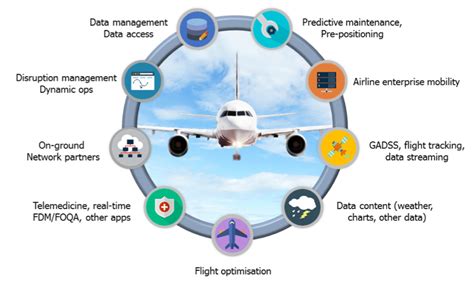The airline industry has undergone significant transformations over the years, and one of the most notable trends is the increasing adoption of mobile technology. With the proliferation of smartphones and tablets, airlines have begun to leverage mobile tech to enhance the passenger experience, streamline operations, and boost revenue. In this article, we'll explore the impact of mobile technology on the airline industry and what the future holds for this trend.
The Rise of Mobile Check-in and Boarding
One of the most significant ways in which mobile technology has transformed the airline industry is through mobile check-in and boarding. Gone are the days of queuing at the airport to print out boarding passes or waiting in line to check-in. With mobile check-in and boarding, passengers can now check-in for their flights, access their boarding passes, and even select their seats using their mobile devices.
This shift towards mobile check-in and boarding has numerous benefits for both airlines and passengers. For airlines, it reduces the need for physical infrastructure and minimizes the risk of lost or misplaced boarding passes. For passengers, it provides a convenient and time-saving way to manage their travel plans.

In-flight Entertainment Takes a Mobile Leap
Another area where mobile technology is making waves in the airline industry is in-flight entertainment. Gone are the days of limited movie options and clunky seat-back screens. With mobile technology, airlines can now offer passengers a vast library of movies, TV shows, and music that can be accessed on their personal devices.
This shift towards mobile in-flight entertainment has several benefits. For airlines, it reduces the need for expensive seat-back screens and minimizes the risk of technical issues. For passengers, it provides a more personalized and convenient way to access entertainment content.
Mobile Payments and Loyalty Programs
Mobile technology is also transforming the way airlines handle payments and loyalty programs. With mobile payments, passengers can now make purchases and pay for services using their mobile devices. This provides a convenient and secure way to manage transactions, and it also reduces the need for physical payment infrastructure.
In addition to mobile payments, airlines are also using mobile technology to enhance their loyalty programs. With mobile apps, passengers can now earn and redeem rewards, track their miles, and access exclusive benefits. This provides a more personalized and engaging way to interact with loyalty programs, and it also helps airlines to build stronger relationships with their customers.
Benefits of Mobile Technology in the Airline Industry
The adoption of mobile technology in the airline industry has numerous benefits for both airlines and passengers. Some of the key benefits include:
- Convenience: Mobile technology provides passengers with a convenient and time-saving way to manage their travel plans, access entertainment content, and make payments.
- Personalization: Mobile technology allows airlines to offer passengers a more personalized experience, with tailored recommendations and exclusive benefits.
- Cost savings: Mobile technology reduces the need for physical infrastructure, minimizes the risk of technical issues, and provides a more efficient way to manage operations.
- Revenue growth: Mobile technology provides airlines with new revenue streams, through mobile payments, advertising, and sponsored content.
Challenges and Future Developments
While mobile technology has transformed the airline industry in many ways, there are still several challenges that need to be addressed. Some of the key challenges include:
- Security: Mobile technology requires airlines to prioritize security, with robust measures to protect passenger data and prevent cyber threats.
- Connectivity: Mobile technology requires reliable and fast connectivity, with Wi-Fi and cellular networks that can support the demands of passengers.
- Integration: Mobile technology requires airlines to integrate their systems and platforms, with seamless connections between different departments and functions.
Despite these challenges, the future of mobile technology in the airline industry looks bright. With the proliferation of 5G networks, the rise of IoT devices, and the growth of artificial intelligence, we can expect to see even more innovative applications of mobile technology in the years to come.
Some of the key future developments to watch out for include:
- Biometric recognition: Airlines are already exploring the use of biometric recognition, with facial recognition and fingerprint scanning to enhance security and streamline the check-in process.
- Virtual and augmented reality: Airlines are also exploring the use of virtual and augmented reality, with immersive experiences that can enhance the passenger experience and provide new revenue streams.
- Artificial intelligence: Airlines are using artificial intelligence to personalize the passenger experience, with tailored recommendations and predictive analytics to anticipate passenger needs.





Conclusion
In conclusion, mobile technology has transformed the airline industry in many ways, from mobile check-in and boarding to in-flight entertainment and mobile payments. As the industry continues to evolve, we can expect to see even more innovative applications of mobile technology, with biometric recognition, virtual and augmented reality, and artificial intelligence leading the way.
Whether you're a passenger, an airline executive, or a technology enthusiast, it's clear that mobile technology is here to stay in the airline industry. With its many benefits, from convenience and personalization to cost savings and revenue growth, mobile technology is poised to shape the future of air travel in exciting and innovative ways.
What is mobile check-in and boarding?
+Mobile check-in and boarding is a process that allows passengers to check-in for their flights and access their boarding passes using their mobile devices.
What are the benefits of mobile technology in the airline industry?
+The benefits of mobile technology in the airline industry include convenience, personalization, cost savings, and revenue growth.
What is the future of mobile technology in the airline industry?
+The future of mobile technology in the airline industry includes biometric recognition, virtual and augmented reality, and artificial intelligence.
